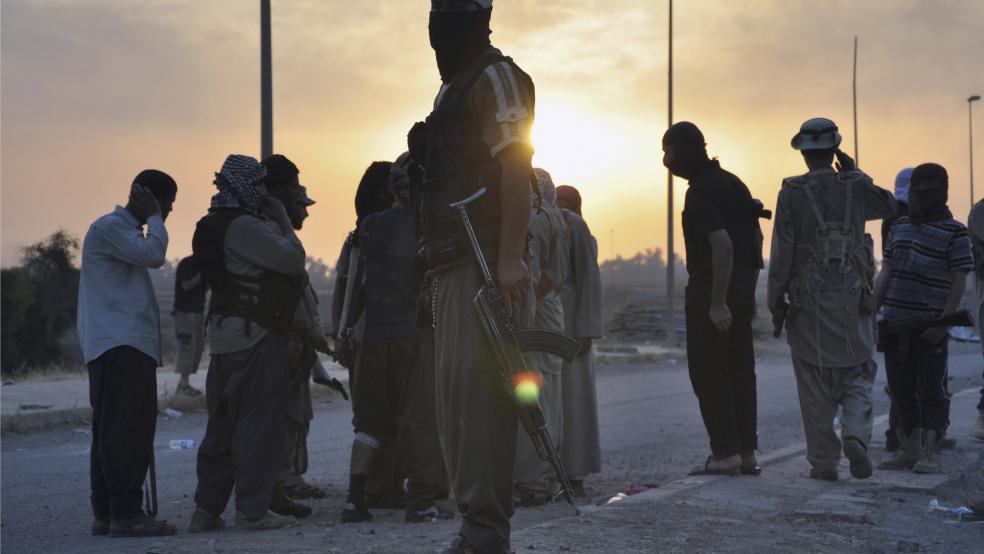When the Islamic State took western Iraq in a matter of days, President Obama downplayed the threat the insurgent group posed to the United States.
“I think it’s important for us to recognize that ISIS is just one of the organizations we have to stay focused on,” Obama said on June 22, adding that the jihadist group posed a “medium and long-term threat,” not an immediate one, to the United States.
Related: Here’s the Real Reason Russia Is in Iraq
In just a few short weeks, this appears to have changed. Speaking in London on Sunday, Attorney General Eric Holder warned that the group is now partnering with Yemeni bomb makers to create weapons he called “more frightening than anything I think I’ve seen as attorney general.”
“It’s something that gives us really extreme, extreme concern,” Holder said.
ISIS fighters in Syria, according to new intelligence reports, are working with the terrorists who created the underwear bomb that a Nigerian national failed to detonate over Detroit on Christmas Day in 2009. These reports have prompted the Transportation Security Administration to increase security at foreign airports. Passengers are now required to power up mobile phones and other electronic devices before people can board, a precaution that hints at the possibility of a cell phone or even a hair dryer could be used as an explosive device.
“Aviation security includes a number of measures, both seen and unseen, informed by an evolving environment,” Homeland Security Secretary Jeh Johnson said in a statement announcing the new measures. “As always, we will continue to adjust security measures to promote aviation security without unnecessary disruptions to the traveling public.”
Related: Iraq Is Latest Battle in U.S.-Russia Proxy Cold War
Wider Ambitions
Holder’s warnings come at a pivotal moment for the group. For weeks, ISIS has stood on the outskirts of Baghdad, seemingly content to declare the formation of a caliphate and control the territory stretching from eastern Syria into western Iraq. There are new indications, however, that the group’s ambitions reach far outside Iraq.
In a recent video, ISIS sets its sights on Jordan. In the video, the group calls the country’s moderate pro-Western King Abdullah a “tyrant” and threatens to “slaughter” him.
If ISIS were to move on Jordan, it could prompt Israel to get involved in the fight. Jordan and Israel have a peace treaty and in the past have pledged cooperation in the fight against Islamic extremism.
“There is a very good cooperation between us regarding ISIS’s growing presence in Iraq and Syria, but also on issues relating to other radical forces in the Middle East which have their sights set on Israel and Jordan,” a Jordanian diplomatic source told Yedioth Ahronoth, a newspaper in Tel Aviv.
Related: The Map That Shows How to Save Iraq
The Islamic State’s alternate name - Islamic State in Iraq and the Levant (ISIL) - also hints at broader ambitions. The Levant region contains not just Iraq, Syria and Jordan, but Lebanon and parts of Israel and the Palestinian territories.
Compromised Military
There are also new reports that ISIS has infiltrated the Iraqi military. An article in The New York Times says an internal DOD assessment found that American military advisers could only advise half of Iraq’s military; the other half have either been influenced by Sunni fighters loyal to ISIS or Shiites from Iran.
The assessment does not contain specific recommendations for what the Pentagon can do to turn back ISIS. However, Gen. Martin E. Dempsey, chairman of the Joint Chiefs of Staff, has already said that Iraqi forces are incapable of retaking territory held by ISIS. “They would be challenged to go on the offense, mostly logistically challenged,” Dempsey said.
ISIS has also managed to get its hands on low-grade uranium. It captured Mosul University, which has roughly 90 pounds of uranium, according to Iraqi U.N. Ambassador Mohamed Ali Alhakim.
A statement by the International Atomic Energy Agency said that the materials posed no proliferation risk. But concerns about the uranium promoted the State Department to assure the public that the material could not be used in a dirty bomb.
State Department spokesperson Jennifer Psaki said the materials were “used for scientific and medical purposes…an important contextual point on our level of concern.”
Top Reads from The Fiscal Times:
- Why Vietnam Will Be the Next Nuclear State
- Japan’s Pivot Away from the West Leads Back to China
- Obama’s Former Syria Ambassador Slams U.S. Policy





